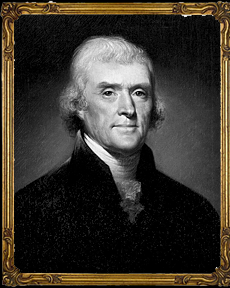
Thomas Jefferson
Term Date: 1801-1809
Political Party: Democratic-Republican
Vice President: Aaron Burr (1801-05); George Clinton (1805-09)
Born Place: Shadwell, Virginia
Born Date: April 13, 1743
Died Place: Monticello
Died Date: July 4, 1826
First Lady: Martha Wayles Skelton
Children: 6
Parents: Peter Jefferson, Jane Randolph Jefferson
Other Political Offices:
Magistrate and as county lieutenant of Albemarle county
Elected to the House of Burgesses, 1769-1774
Member of Continental Congress, 1775-1776 and 1783-1785
Governor of Virginia, 1779-1781
Minister to France, 1785-1789
Secretary of State, 1790-1793
Vice President, 1797-1801
Occupation before elected:
Lawyer, planter
Brief History:
His father, Peter Jefferson, a man of legendary strength, was a successful planter and surveyor who gained minor title to fame as an explorer and mapmaker. In 1772 he married Martha Wayles Skelton, and took her to live in Monticello. He was chosen in 1776 to draft the Declaration of Independence. In 1796 he was admitted to the bar in 1767 and practiced until 1774. He was supported by the Republicans for president in 1796, and running second to John Adams by three votes, he became Vice President. Jefferson came within three votes of election. When he assumed the Presidency, the crisis in France was over. In his first inaugural address in March, 1801, Jefferson pleaded for national unity. He reduced Army and Navy spending, and eliminated the tax on whiskey, yet reduced the national debt by a third.
Jefferson restored the party balance in the civil service although the attempted effort to remove partisan judges by impeachment was a failure. The Louisiana Purchase in 1803, for 15 million, doubling the size of the nation and was a most notable achievement of Jefferson's presidency. Jefferson had to deal with the political war waged between the Republican Party and the Federalists. The battles were mostly within the judiciary branch. He lead a simple lifestyle during his time in office, often greeting his dinner guests in homespun clothes and a pair of worn bedroom slippers. He was succeeded as president in 1809 by his loyal lieutenant, James Madison. Believing that the government was not being conducted in the spirit of 1776, he turned against the leadership in Washington's second term. During the last 17 years of his life, Jefferson remained in Virginia. He was joyful to be free of executive duties and ready to satisfy his curiosity for life. In retirement, Jefferson pursued science and natural history through research, experimentation and invention. He loved to entertain his guests with fine wine and foods. Jefferson wrote his own epitaph without mentioning he was president of the United States. Jefferson retired to Monticello to ponder such projects as his grand designs for the University of Virginia.
Jefferson restored the party balance in the civil service although the attempted effort to remove partisan judges by impeachment was a failure. The Louisiana Purchase in 1803, for 15 million, doubling the size of the nation and was a most notable achievement of Jefferson's presidency. Jefferson had to deal with the political war waged between the Republican Party and the Federalists. The battles were mostly within the judiciary branch. He lead a simple lifestyle during his time in office, often greeting his dinner guests in homespun clothes and a pair of worn bedroom slippers. He was succeeded as president in 1809 by his loyal lieutenant, James Madison. Believing that the government was not being conducted in the spirit of 1776, he turned against the leadership in Washington's second term. During the last 17 years of his life, Jefferson remained in Virginia. He was joyful to be free of executive duties and ready to satisfy his curiosity for life. In retirement, Jefferson pursued science and natural history through research, experimentation and invention. He loved to entertain his guests with fine wine and foods. Jefferson wrote his own epitaph without mentioning he was president of the United States. Jefferson retired to Monticello to ponder such projects as his grand designs for the University of Virginia.

